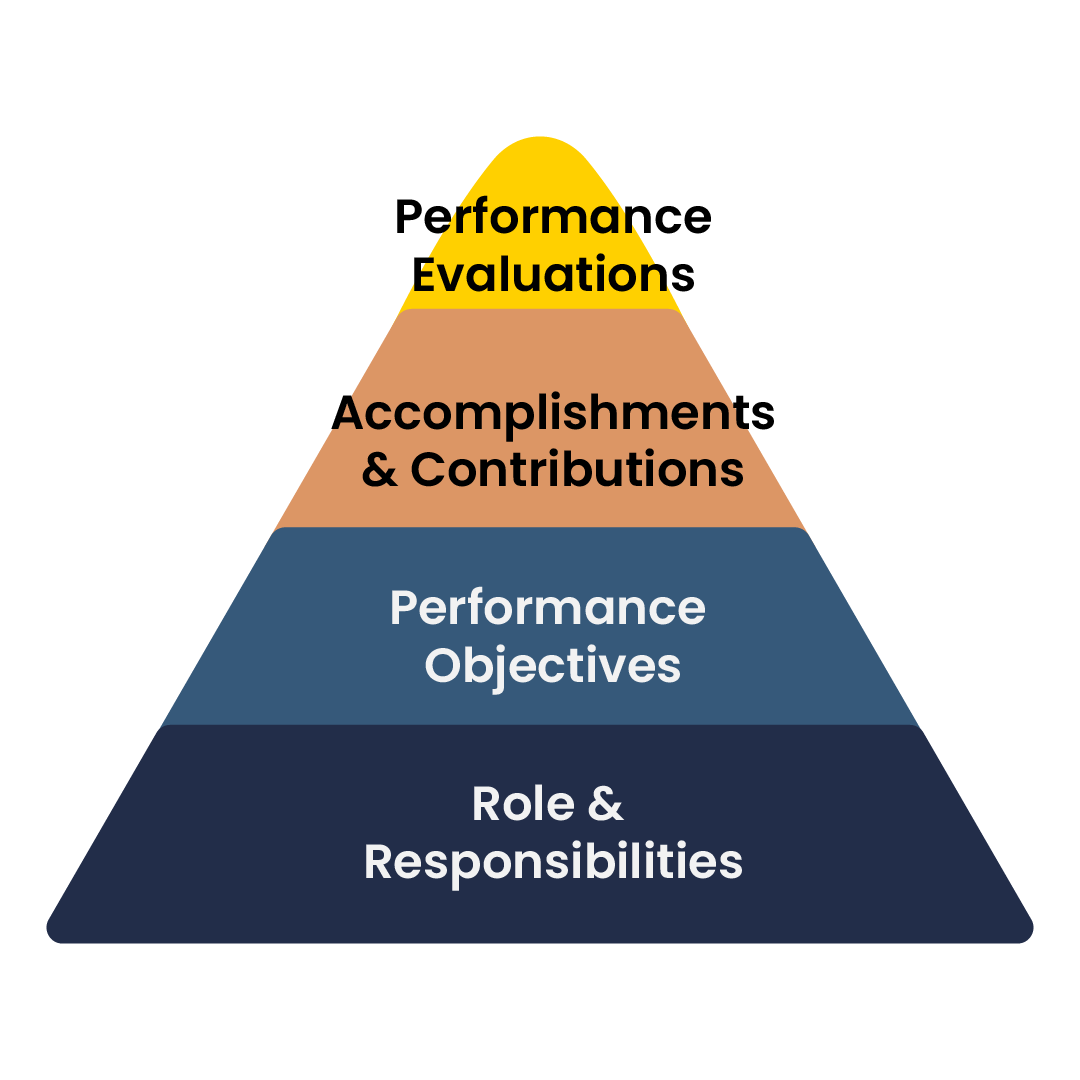The Achieve Mindset
Listening time: 4:47
Each day presents an opportunity for professional growth and achievement. We continuously set and pursue personal and professional goals, aiming for excellence in all our endeavors. In a work setting, this translates to meeting objectives and excelling in performance evaluations.
To achieve top evaluations, open communication with your supervisor is essential; it's a two-way street where your accomplishments are highlighted and any areas for improvement are addressed.
When you implement the Achieve Mindset from the Mérito Mindset Framework, you’re implementing a mindset of managing your performance to be recognized and acknowledged for your accomplishments.
Achieve Mindset
A holistic approach to achieving excellence in your performance evaluations.
But first, let’s understand how performance management works.
In performance management, organizations establish strategic goals that are then translated into specific objectives for individual employees. Employee performance is evaluated annually against these objectives using a rating scale from "Unsatisfactory" to "Achieving Excellence." These performance ratings directly influence compensation, including bonuses, raises, and promotions.
Upon starting a new job, request the full job description and performance evaluation standards, as postings and interviews only summarize your role. The full description will outline behavioral competencies, including responsibilities, knowledge, skills, and abilities.
Your supervisor will outline goals tied to the organization's strategic plan, which will be evaluated annually. The position description also specifies the weighted percentage of each responsibility and core behavioral competencies, like communication and teamwork.
A clear understanding of your roles and responsibilities is essential for achieving peak performance, as it provides a solid foundation for what is expected. This is relevant for all employees at any stage of their career.
Now that you have the job description and performance evaluation, it is time to manage your performance.
Your annual performance cycle defines your performance goals and objectives for the year. This is crucial because the quality of your work in achieving these objectives will be the basis of your rating. For example, did you meet these goals and objectives ahead of schedule, and to what extent did the quality of your work meet expectations?
Your performance objective serves as your guide for prioritizing assignments. It's easy to lose focus and stray from your performance objectives once you're immersed in the daily activities of your role and responsibilities.
Keep a summary of your performance objectives with you so that you can prioritize your work and pinpoint any projects that fall outside of your roles and responsibilities.
For some, defining accomplishments can be difficult, as their daily work often becomes second nature.
Some have said:
“I just do my work.”
“My accomplishments are not significant.”
“My objective was not defined as a SMART (specific, measurable, attainable, relevant, and time-bound) goal. So I’m not sure if I have any accomplishments.”
Take time daily, after each task or at day's end, to reflect on your accomplishments and their significance to both you and the organization. You consistently contribute to the organization's goals and deserve recognition for your efforts.
If you find it challenging to outline your accomplishments, start with the statement: I did ‘X’, which resulted in ‘Y’, and fill in ‘X’ and ‘Y’ with the action and its corresponding result.
After a few weeks or months, you will find it easier to articulate your accomplishments.
For example:
I balanced the journal entries within 3 days, resulting in a timely closeout so the organization could prepare its quarterly statement on time.
I identified ten incorrect billing statements, which reduced the number of denied claims and allowed for the timely receipt of payments.
I coordinated onboarding equipment in advance, which resulted in a smooth onboarding process.
Remember, small wins can lead to significant victories. Describe your accomplishments in one to two sentences weekly and then consolidate them into a monthly self-review.
And, aim to meet monthly/quarterly with your supervisor to align accomplishments with performance objectives. These discussions provide opportunities to assess your performance, share ideas for improvement, and identify potential, which aids in mid-year and year-end reviews.
Also, seek feedback from coworkers; sometimes, they provide insight into your potential skills that you may be unaware of.
Taking ownership of your experience, skills, and accomplishments ensures that you receive the recognition you deserve. The goal is a two-way conversation where your supervisor highlights your achievements and you fill in the gaps. A holistic approach enables confident articulation during evaluations.
That’s the Achieve Mindset: A holistic approach to achieving excellence in your performance evaluation.
Understand your roles and responsibilities by obtaining a copy of your position description.
Focus on your performance objectives by always keeping a summary on hand.
Track your accomplishments daily or even weekly.
Meet with your supervisor on a monthly or quarterly basis to discuss your performance, allowing you to prepare for your year-end performance evaluation discussion.
Follow these four actions and take…
“Professional growth in your hands!”
Ish & Raquel
Schedule a call with us to learn more about the Mérito Mindset

